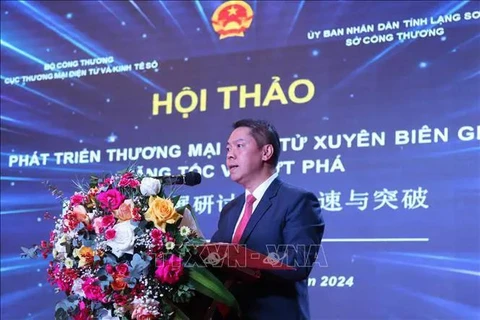
Hanoi (VNS/VNA) - The rapid growth of e-commerce has contributed significantly to Vietnam's economic development, but it also brought challenges, particularly in tax management.
This has led lawmakers to carefully revise the Tax Administration Law and the Value Added Tax Law to ensure compliance with domestic regulations and alignment with international agreements.
From April 1, 2025, e-commerce and digital platforms with payment functions will be required to declare and pay taxes on behalf of business households and individual sellers, as stipulated in the law amending nine laws passed by the National Assembly on November 29.
The Ministry of Finance is also considering removing the tax exemption for low-value imported goods, to address tax revenue losses from e-commerce transactions.
Currently, goods worth under 1 million VND (39 USD) are exempt from taxes, in line with international commitments. However, the growth of e-commerce has led to more cross-border transactions of low-value goods, causing tax revenue losses. The ministry is reviewing this policy to protect domestic businesses and improve tax management.
The two issues mentioned above have recently garnered significant attention and comments.
A recent article on thesaigontimes.vn discusses the possibility of incorporating international best practices from the Organisation for Economic Co-operation and Development (OECD)'s recommendations into Vietnam's draft Law on Tax Administration and Law on Value Added Tax (VAT) to foster a more equitable and business-friendly environment.
In 2019, the OECD highlighted the key role digital platforms play in VAT collection for online transactions. The report proposed a framework for efficient VAT collection that eases administrative burdens for businesses and benefits tax authorities. Adopting this approach in Vietnam could simplify tax collection for e-commerce, creating a fairer, more competitive business environment.
The OECD recommends a 'full VAT liability' system, where digital platforms handle all VAT calculations, collections and payments, removing this responsibility from individual sellers and reducing double taxation risks. Vietnam’s draft tax laws are moving towards this by requiring e-commerce platforms to manage VAT for businesses using their platforms, both domestic and foreign.
However, successful implementation depends on two key conditions outlined by the OECD: platforms must have access to accurate transaction data and the ability to collect VAT efficiently. For platforms meeting these criteria, tax authorities can create clear guidelines. For example, platforms that set transaction terms or handle payments could be prioritised for these regulations.
Vietnam's draft law currently mandates platforms with payment functions to handle VAT collections, but this definition needs refining.
Under Decree 52/2013/NĐ-CP, some platforms merely facilitate display or advertising, making them unsuitable for VAT collection. Therefore, the law should focus on platforms with 'online ordering' functions that can provide the necessary transaction data for accurate tax calculations. Furthermore, VAT obligations should only apply to transactions processed through online payment systems, excluding cash-on-delivery transactions where platforms cannot control the financial flows.
In addition, the definition of "other organisations" tasked with tax obligations under the draft law needs clarification, to avoid burdening unrelated entities like logistics companies. A more precise definition, aligned with international practices, is necessary.
The OECD also recommends flexible exemptions for smaller platforms or start-ups, reducing barriers and promoting competition. However, exempted platforms should still share transaction data with tax authorities to ensure transparency.
Vietnam's revised tax framework should consider both buyers and sellers. The OECD recommends unified tax rules for sellers, regardless of whether they are domestic or foreign, to simplify compliance. Tax thresholds should be clearly defined, especially for sellers operating on multiple platforms, to avoid challenges in determining VAT liability.
Minimis threshold
In Vietnam, the de minimis threshold, which exempts low-value imports from VAT, is being reconsidered due to the rise of low-cost goods from platforms like Temu and Shein. According to legal expert Ngo Vinh Bach Duong from the Institute of State and Law, while proposed policy changes could remove VAT exemptions, careful consideration is needed to balance tax collection with trade facilitation.
Duong highlighted the crucial role of e-commerce platforms in tax administration. He emphasised that platforms provide data, collect and remit taxes and ensure compliance. Cooperation between e-commerce platforms and tax authorities could create a more effective tax system, reducing fraud and promoting fairness.
One solution he proposed is to assign e-commerce platforms the responsibility of collecting and remitting taxes on cross-border transactions. This could address tax evasion and transactions outside the tax jurisdiction, though its feasibility depends on implementation conditions.
The destination principle, where VAT is collected in the consumer’s country, is widely accepted for cross-border trade. The OECD recommends this approach, but managing cross-border VAT remains challenging due to difficulties in verifying transactions and determining the correct tax jurisdiction.
For buyers, VAT/GST (Goods and Services Tax) is typically paid by them, but determining who collects it in cross-border transactions is complex. Proposed solutions like self-assessment have proven ineffective for individual consumers.
The draft amendments to the Tax Administration Law focus on e-commerce platforms' tax responsibilities. However, these changes may increase compliance costs and create challenges for local platforms competing with larger international ones. Tax authorities must ensure the necessary infrastructure and support to implement these new obligations effectively, Duong said.
E-commerce makes up over 60% of Vietnam's digital economy, with strong and continued growth expected in the near future. The country's e-commerce market is set to become the fastest-growing in ASEAN by 2026, with the potential to reach nearly 50 billion USD in annual transactions by 2028, according to YouNet ECI and YouNet Media. This growth is supported by a favourable legal environment and an increasingly tech-savvy consumer base.
Assigning tax collection duties to e-commerce platforms is a global trend, but it requires clear guidelines on the platforms' rights and responsibilities. Vietnamese platforms, unlike global giants like Amazon or Alibaba, may not have the same resources, so a transition time should be developed to help them adapt.
The Government also needs to ensure the feasibility of the new rules by providing the necessary infrastructure, such as automated tax systems. The tax authority could offer free or affordable tools like APIs to help platforms meet their obligations without high compliance costs./.






















